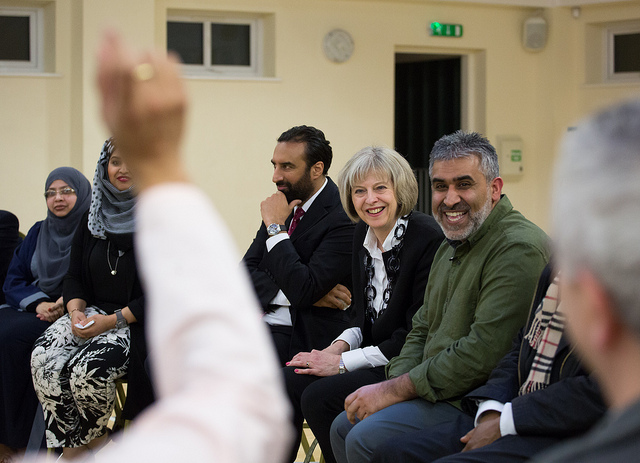Theresa May’s announcement of new community sponsorship schemes was the silver lining of her conference speech
Theresa May’s speech at the Conservative Party conference, which focussed largely on immigration and its supposed negative societal and economic effects proved to be controversial, finding criticism even amongst conservative supporting newspapers and members of her own party. Marley Morris however found some promise in the ideas she presented around community sponsorship.

Credit: UK Home Office, CC BY 2.0
Theresa May’s speech on immigration last week won her few plaudits, even from parts of her own party and from normally sympathetic newspapers. Her critique of the economic and social impacts of migration was remarkably one-sided – there was little mention of the considerable evidence of immigration’s positive contribution to bringing down the deficit, staffing the NHS, and enriching Britain’s society and culture.
But underneath the resolutely gloomy tone on the impacts of migration to the UK was a potentially promising development on asylum policy. May acknowledged the changing nature of the debate around refugees over the summer and aspired to “increase the number of people we help in the most troubled regions”.
Her emphasis on shifting policy towards refugee resettlement and away from spontaneous asylum applications – because this prioritises the most vulnerable people – is, as we have argued at IPPR, the fairest and most humane way of managing asylum policy – though her reforms must not be an excuse for reducing protections for refugees in need.
But most encouraging was May’s announcement of new community sponsorship schemes, modelled on similar programmes used in Canada, Germany and Australia. These schemes allow community groups and volunteers to ‘sponsor’ refugees by covering their living costs when they arrive, helping them to find a job, and settling them into their local community.
This policy would be a fitting response to the public upswell of support for refugees over the summer. A programme like this would allow the government to tap into public sympathy by giving people the opportunity to provide tangible help for refugees arriving in Britain.
So these schemes are in principle a good thing. But rolling them out will not be straightforward. Here the devil is in the detail – and a number of questions remain unanswered.
First, it is not clear whether these community sponsorship schemes will be part of the government’s commitment to resettle 20,000 vulnerable Syrian refugees over the next five years, as with the Australian model, or whether sponsored refugees will be in addition to the 20,000 figure (or part of the Gateway Programme).
For the scheme to work effectively it should exclude privately sponsored migrants from the 20,000 figure. After all, sponsors will want to know that their actions are making a real difference to refugees’ lives – if volunteers are just picking up the slack from the government by contributing to a pre-determined commitment to resettle 20,000 refugees, there is less of a reason for them to want to be involved.
Second, May did not give details on what people will be asked to do in order to sponsor a refugee. For the Australian pilot programme, sponsors were asked to pay visa fees of between $20,000 and $30,000 per person on top of paying for the costs of resettling refugees. This was met with considerable disappointment from the voluntary sector, as many smaller community groups simply couldn’t afford the extra fee.
The government should ensure that there are no additional costs for sponsors – or at the very least they are kept to an affordable amount.
At the same time, the government should also make sure that the sponsor’s role is not limited to simply a financial contribution. In Canada, sponsors areexpected to provide support with finding a job, language training, familiarisation with public services, and introductions to likeminded locals. Aside from helping with living costs, sponsors should also have some responsibility to help refugees become self-sufficient and settled into British society.
Third, there is the question of who will be eligible to be sponsored. Clearly there is a need to secure public confidence in the system and avoid abuse. One sensible way of doing this is to follow the Canadian model and allow only those who have been identified as refugees for resettlement by the UNHCR or by another country to be candidates for sponsorship.
These are all challenges – but they are far from insurmountable. And the Canadian model shows that private sponsorship agreements can work well: a 2007 evaluation of the scheme found that privately sponsored refugees in fact integrated into the labour market more swiftly than their government assisted counterparts, earning on average $6000 more through employment in their first year of arrival.
If handled correctly, this scheme gives the home secretary an opportunity to harness public compassion to relieve some of the pressure off local councils, improve integration outcomes for refugees, and develop a positive narrative around Britain’s role in the refugee crisis in the process.
That could win her plaudits across the spectrum.
—
This post originally appeared on Left Foot Forward and is reposted with the permission of IPPR’s press office. It represents the views of the author and not those of Democratic Audit UK or the LSE. Please read our comments policy before posting.
—
 Marley Morris is a Researcher at IPPR.
Marley Morris is a Researcher at IPPR.





 Democratic Audit's core funding is provided by the Joseph Rowntree Charitable Trust. Additional funding is provided by the London School of Economics.
Democratic Audit's core funding is provided by the Joseph Rowntree Charitable Trust. Additional funding is provided by the London School of Economics.
Theresa May’s announcement of new community sponsorship schemes was the silver lining of her conference speech https://t.co/85tOgUhF6E
Theresa May’s new community sponsorship schemes were silver lining of her conference speech https://t.co/kTQposX5bS https://t.co/6tAeupfsPd
‘Theresa May’s community sponsorship schemes was the silver lining of her conference speech’ – IPPR’s @MarleyAMorris https://t.co/lyiH6ep5T6
Theresa May’s announcement of new community sponsorship schemes was the silver lining of her conference speech https://t.co/nT64rI2JIS
Theresa May’s announcement of new community sponsorship schemes was the silver lining of… https://t.co/lxZaOnxAWR https://t.co/JyHxtCY65w